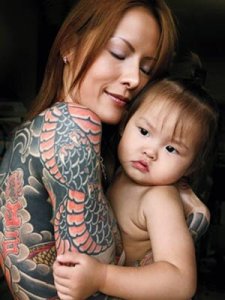Tendo and daughter
The Café de Paris in Tokyo is bustling with chic young women sipping coffee and reveling in the restaurant’s air of faux-French refinement. Shoko Tendo calmly puffs on a cigarette beneath the twinkling chandeliers. She knows she could shatter the decorum by merely rolling up her sleeves. Her arms — and almost every other inch of her birdlike body — are plastered with the trademark tattoos of a Japanese gangster.
Instead, she’s careful not to reveal that she comes from the yakuza, Japan’s much-feared world of organized crime. Despite the cloying late-summer heat, she’s clothed practically head to toe, in a long-sleeve lilac shirt layered over a white tee and skinny jeans. She’s a different kind of rebel these days. Leaving behind her gangster loyalties, she has become a talk-show celebrity in Japan — the first female ever to break the code of silence and speak about life for women in the underworld.
In a knee-jerk way, I expect the russet-haired Tendo, whose father was a high-ranking mob boss, to be intimidating, or at least loud and brash, but she speaks to me with a quiet thoughtfulness in her native Japanese. Her best-selling memoir, Yakuza Moon, shocked this conservative nation three years ago with its graphic accounts of her addictions to sex, drugs, and violent lovers. With the book’s recent publication in the U.S., she has agreed to do her first-ever interview with a foreign magazine to discuss the impact of her decision to speak out — and about her life now as a single mother.
She’s more relaxed in person, with an iced coffee in hand, than she appears in her book, so I jump right in and ask why she’s still alive after writing it. Usually, any kind of betrayal in the mob world is an automatic death sentence. And the yakuza are an especially macho bunch, known for rituals that signify their fanatic allegiance, such as severing their little fingers to atone for mistakes. “I was really nervous about that,” Tendo says. “But I think I’ve gotten away with it so far partly because I focused only on my own experience and didn’t incriminate anyone else.” Yes, she gets threatening phone calls, but Tendo, 39, insists she has no regrets. “I needed to do this for myself to find out where I belong in the world,” she says, explaining that yakuza women, while rarely involved in criminal activities themselves, are vilified by association. “People in Japan can smell it if you come from a background like mine — you can’t hide it. I wanted to change my life, but I realized the only way I could do that was by first being honest about who I was.”
Marie Claire
